“Journey’s End”
Written by Ronald D. Moore
Directed by Corey Allen
Season 7, Episode 20
Production episode 40276-272
Original air date: March 28, 1994
Stardate: 47751.2
Captain’s Log: The Enterprise arrives at Starbase 310 for a meeting with Admiral Nechayev. Wes is also on a break from the Academy and is visiting, though despite the friendly face he puts on for Crusher, La Forge, and Data, he looks distressed.
Nechayev explains to Picard the new treaty terms between the Federation and Cardassia that has redrawn the border between the two powers. There’s a Demilitarized Zone between the two nations and the new borders put several Federation colonies in Cardassian space and vice versa. Nechayev’s response to Picard mentioning this is to say, “This agreement is far from perfect,” which is the understatement of the decade. She follows it by misquoting Otto von Bismarck, saying, “diplomacy is the art of the possible.” (The original quote’s first word was “politics,” not “diplomacy.”)
The colonies have to be evacuated, and the Enterprise has been assigned to evacuate Dorvan V, a colony of North American Indians. Picard pointing out the historical parallel with what Indians went through centuries earlier when Europeans started showing up fall on deaf ears. Nechayev made the same arguments to the Federation Council that Picard is making now. His orders are to remove them—by force if necessary.
Picard and Troi meet with the tribal council to discuss places to relocate. They are, understandably, unhappy. They searched the galaxy for two centuries before they finally found Dorvan V two decades ago. They do not wish to start another such journey.
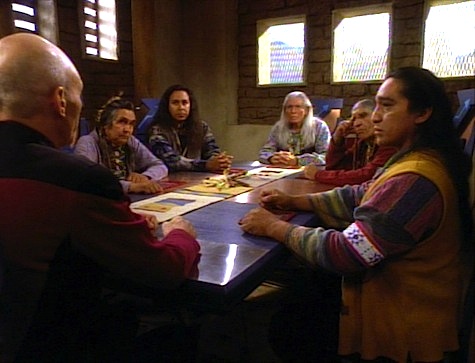
Wes comes into engineering in civilian clothes and proceeds to snottily rip apart one of La Forge’s engine modifications. When Crusher takes him to task on the subject, Wes snaps at her, too.
The Enterprise plays host to a reception in Ten-Forward for the Dorvan colonists. Picard and Anthwara, the head of the council, discuss each other’s ancestors—and Anthwara makes it clear, despite Picard’s urging that it’s for the greater good, that he and his people aren’t planning to go anywhere. Meanwhile, Wes shows up and, after a quick apology to his mother, meets Lakanta, who claims that he saw Wes in a vision quest two years earlier, and that Wes came to Dorvan to find the answers he seeks.
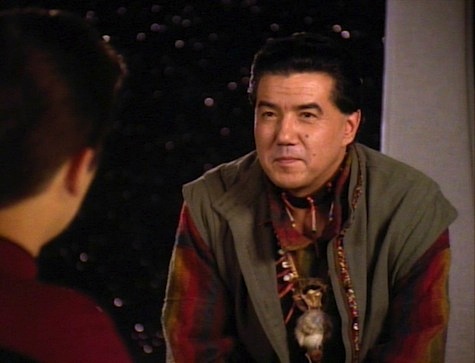
Crusher goes to Picard, concerned about her son—in addition to his obvious attitude problems, his grades are suffering as well. But Picard insists that he has to work this out.
Wes beams down to Dorvan. Lakanta explains that they hold everything sacred—including Wes. And if he is something sacred, then he should treat himself with more respect. Lakanta then takes Wes to the Habak so he can go on a vision quest.
Picard makes it clear to the council that he cannot take no for an answer. Anthwara does not believe that Picard will do so. An ancestor of Picard’s was involved in the Pueblo Revolt and its brutal aftermath in the 17th century. Anthwara believes that Picard specifically was sent to Dorvan V to erase the blood stain of his ancestor.
The Cardassians have arrived six weeks earlier than anticipated. Gul Evek insists to Picard that they’re a preliminary survey team—but he also doesn’t understand why the evacuation hasn’t commenced.
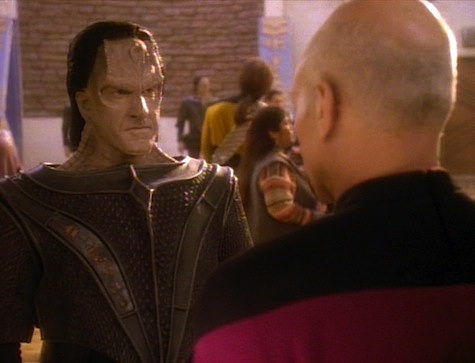
After an appeal to Nechayev fails—the Federation Council stands by its decision, Dorvan’s inhabitants be damned—Picard reluctantly orders Worf to prepare to remove the colonists by force.
In the Habak, Wes sees a vision of his father, who insists that he’s at the end of a journey he began when Jack Crusher died. He needs to go on his own journey now, not the one he thought he had to go on after his father’s death.
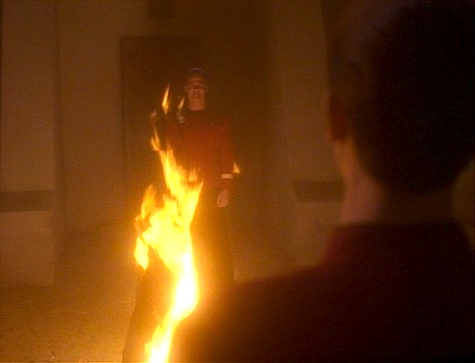
When he leaves the Habak, he sees Worf making preparations to beam out the colonists, and he then reveals that plan to the people of Dorvan. Picard is furious and chews Wes out. Wes insists it’s wrong, and Picard knows that damn well, but he also has his orders, as does Wes.
Except Wes doesn’t anymore, as he removes his combadge and resigns.
Wes explains to Crusher that he’s been a mess for a while, not feeling right at the Academy. The vision just brought it all into focus. He hadn’t said anything to Crusher or anyone because he was worried about disappointing them—and himself.
He beams down to Dorvan, and discovers that the colonists have taken Evek’s people prisoner. Evek wants to beam down troops to take the prisoners back by force (even though he can easily beam the prisoners off the planet), but Picard makes it clear that Worf and his security detail on the planet will defend any attack on Federation citizens.
On the surface, things get out of hand when the prisoners try to escape on their own—
—and then everything and everyone freezes, except for a distraught Wes, and Lakanta, who explains that Wes has pulled himself out of their time. And then Lakanta transforms into his true form, that of the Traveler. Wes is on the first step of a new journey that will take him far beyond any human experience.
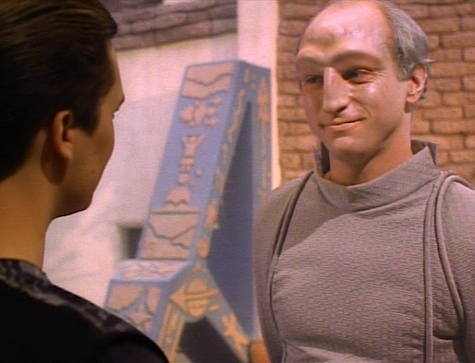
Meanwhile, in real time, the firefight continues. Evek reluctantly agrees to simply beam his people off the planet instead of taking direct action against the colonists—Evek explains to Picard that he lost two of his three sons in the war against the Federation. He does not wish to lose the third.
Picard, Evek, and Anthwara come to an agreement whereby the colonists remain on Dorvan—but under Cardassian jurisdiction. They are, in essence, renouncing their Federation citizenship. Evek says that the Cardassians who come to the world will leave them alone as long as they do likewise, to which Anthwara agrees.
Wes beams down to Dorvan, as he will begin his studies as a Traveler there. (“Just what I need, more studying.”) He has a solemn goodbye scene in the transporter room with Picard and Crusher.
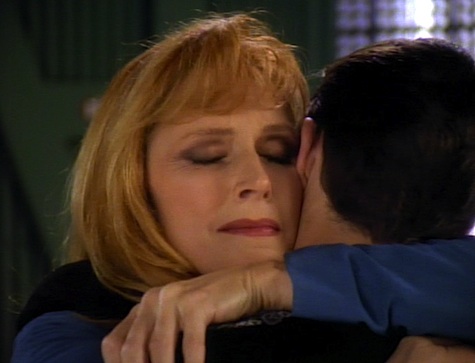
Thank You, Counselor Obvious: Troi’s interest in the “ancient west,” established in “A Fistful of Datas,” apparently extended to the history of the region as well as the stories told, as she’s familiar with the Pueblo Revolt.
If I Only Had a Brain…: When Data and La Forge greet Wes in his quarters upon arrival, they joke about a cadet running loose on board and that they should call security. Data being Data, he feels the need to explain to Wes that it was a joke.
There is No Honor in Being Pummeled: Worf has the unenviable task of getting the colonists off Dorvan, a task made more complicated by Wes being a douche.
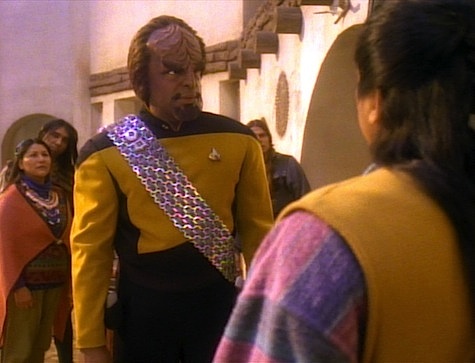
The Boy!?: Wes has the worst case of senioritis ever, and he’s not even a senior yet. He finally comes to the realization that a career in Starfleet is what everyone expected of him, but isn’t necessarily what’s right for him. (Given the greatness that the Traveler saw in him way back in “Where No One Has Gone Before,” becoming just another button pusher on a starship seems a bit of a comedown, anyhow…)
I Believe I Said That: “Now be sure to dress warmly on those other planes of existence.”
Crusher’s final words to her son before he goes off to become a higher being.
Welcome Aboard: Lots of returning guests here: Wil Wheaton, obviously, is back for Wes’s swan song. Natalia Nogulich returns as Admiral Nechayev, having last been seen taking Picard to task in “Descent”; she’ll next be seen in “The Maquis, Part II” on Deep Space Nine. Eric Menyuk returns as the Traveler, last seen in “Remember Me.” And for the third time, following “Family” and “Violations,” Doug Wert appears as an image of Jack Crusher.
Ned Romero returns to Trek as Anthwara—he played Krell, the Klingon in “A Private Little War” on the original series, and will return as the image of Chakotay’s grandfather in Voyager’s “The Fight.” George Aguilar and Tom Jackson play, respectively, Wakasa and Lakanta.
Finally, Richard Poe appears as Gul Evek, who was introduced in DS9’s “Playing God,” and will continue to appear on both TNG and DS9 , and also is the Cardassian chasing Chakotay at the beginning of Voyager ’s pilot episode. This makes the character of Evek one of only four characters to appear on all three 24th-century Trek shows (the others being Q, Quark, and Morn).
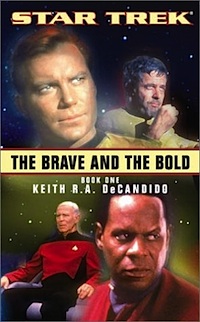
Trivial Matters: Aside from a very brief cameo in Star Trek Nemesis , this is Wil Wheaton’s final Trek appearance as Wes. The character continues to appear in several works of tie-in fiction as a Traveler, including the short stories “Gods, Fate, and Fractals” by William Leisner, “Research” by J.R. Rasmussen (both in Strange New Worlds II) and “Adventures in Jazz and Time” by Kelly Cairo (Strange New Worlds VII); and the novels Enemy of My Enemy by Christie Golden, A Time to be Born and A Time to Die by John Vornholt, your humble rewatcher’s A Time for War, a Time for Peace (which reconciles his being a Traveler with his appearance in Nemesis), and David Mack’s Cold Equations trilogy.
This episode starts an ongoing thread in both TNG and DS9 involving the Demilitarized Zone between Cardassian and Federation space, leading to the formation of a rebel group, which will be formed in the DS9 two-parter “The Maquis.” TNG will next tackle this thread in “Preemptive Strike.” The storyline was intended to help set up Voyager, though it also became an ongoing concern on DS9.
Evek will appear in several works of tie-in fiction as well, including Susan Wright’s The Badlands, your humble rewatcher’s The Brave and the Bold, and Andrew J. Robinson’s A Stitch in Time . (I also portrayed his Mirror Universe counterpart in The Mirror-Scaled Serpent in Obsidian Alliances.)
Although it was never stated onscreen, the intention was always for Dorvan V to be the planet that the Voyager character Chakotay came from. The post-finale Voyager novels by Christie Golden and Kirsten Beyer have made that explicit.
Wes cites Dr. Vassbinder, who was previously mentioned by Picard in “Timescape” as giving an incredibly boring lecture.
Corey Allen also directed Wes’s first appearance in “Encounter at Farpoint,” his final appearance as a regular in “Final Mission,” and the character’s first return to the ship after departing the regular cast in “The Game.”
Crusher mistakenly refers to the Traveler as coming from Tau Ceti rather than Tau Alpha C. She also tells Wes what the Traveler told Picard about Wes in “Where No One Has Gone Before.” Of course, the Traveler specifically told Picard not to tell anyone about Wes’s special nature, “especially the mother.” It’s possible that Picard ignored the Traveler’s advice and told Crusher—it’s also possible that Crusher found out about it when she and Picard were mentally linked in “Attached.”
Make it So: “Maybe I’m sick of living up to everyone else’s expectations!” And so we continue the round of “hey, let’s get one last look in on our recurring characters before we go off the air” episodes. Last time it was Barclay, now it’s Wes. We’ll get Alexander next, and Ro a bit after that. Cha cha cha.
Ron Moore said in an AOL chat in 1997 that he was the one pushing for Wes to leave Starfleet, and I think it was absolutely the right choice. While there are no explicit references to the events of “The First Duty” in this episode, it’s obvious that it was a bucket of ice water in the face for the character. His journey in this episode makes perfect sense. After all, his Starfleet career was kind of shoved in his face. He had a fascination for the workings of the ship, but that doesn’t necessarily translate into becoming an officer, just in getting involved with the sciences. It was Picard who made him an acting ensign in response to the Traveler telling him Wes was akin to Mozart, which can be seen as putting the pigeon in entirely the wrong hole.
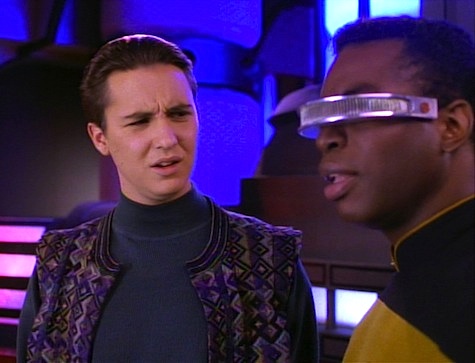
Unfortunately, that part of the story feels creaky, partly because Wil Wheaton brings no nuance to the role. He’s either out of sorts or totally obnoxious. Wheaton is much better now at doing this sort of thing—all of his recent roles have been snotty bastards—but he was obviously new to playing a jackass in 1994 and didn’t quite get it right. It doesn’t help that Tom Jackson is awful as Lakanta, playing the stereotypical “wise Indian” character with all the gravitas of a badly translated fortune cookie.
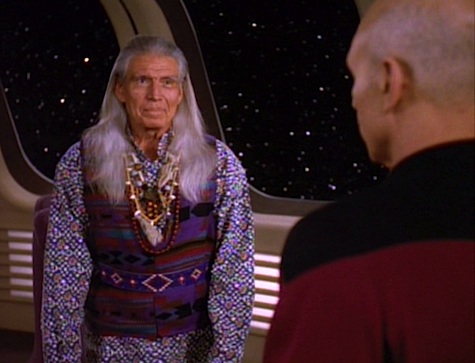
The rest of the episode is far more compelling. I liked the interplay between Picard and Nechayev, with Picard making an effort to make Nechayev welcome and comfortable on the Enterprise, and with Nechayev remaining a hardass, but a compassionate one, one who has already made (and lost) all the arguments Picard is making. She also thanks Picard for making the effort to make her welcome on his ship. The scenes between Picard and Anthwara are also excellent, as Ned Romero does right what Jackson does wrong, giving a nicely understated performance. And Richard Poe does a much better job of snotty than Wheaton as Evek, with the added bonus of being convincing in his pained explanation to Picard of why he won’t fire on the colony.
And in the end, the solution is not a perfect one. In fact, it’s a crappy one, but it’s also the only one that will work in the situation. This episode marks the beginning of a period in Trek history where the chinks in paradise will get shown (which we’ll mostly see on Deep Space Nine). The treaty between the Cardassians and Federation is a classic compromise in that it makes no one happy, and like far too many decisions made by those in the halls of power, have unintended consequences for the ordinary person. Both DS9 and Voyager will run with these (the former in actual story sense, the latter really only for its setup), but this is the episode that really set it in motion. It’s only Trek’s second shot at an ongoing story thread, and the only one that encompassed three separate TV shows.
In any case, this was a fitting end to the character of Wesley Crusher: an interesting notion only partially successfully executed.
Warp factor rating: 6
Keith R.A. DeCandido will be at Lunacon 56 this weekend in Rye Brook, New York. Here’s his schedule.










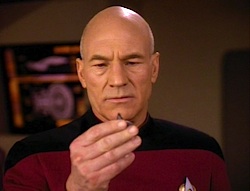
Never really cared for this episode due to my dislike of the whole Wes-is-special idea, which always struck me as pandering to the sort of nerds who think being intelligent makes them better than everyone else. The story would’ve been much stronger if the Traveler hadn’t shown up and instead Wes decided to stay on the colony because he felt the Federation was betraying its ideals.
Plus, it sets up a huge plot hole for All Good Things — why didn’t Picard just say to Q, “What do you mean humanity hasn’t advanced in the last seven years? Didn’t you watch Journey’s End. Wesley evolved to a higher state of being!”
The only thing that really struck me about the episode was the repeated use of the word “Indian” rather than “American Indian” or “Native American” or even the tribal name, although if it was mentioned I can’t remember it despite having watched the episode less than 2 hours ago. Perhaps this was filmed before that began to make a difference.
The idea was great, but the depiction of the Native American settlement was incredibly unimaginative and clumsy; instead of showing us a culture that had evolved, as cultures do over time, from Native Americans we got cliched Hollywood Indians. I suppose that was visual shorthand to make them recognizable and drive home the point but, damn, what a lost opportunity.
The Native American culture in this episode are very stereo typical and annoying. I’m not a Wesley hater but I didn’t like him in this episode he was a pain. I still can’t decide whether I like him becoming a Traveler or not.
On Evek: The Cardassian that Richard Poe played in “Playing God” was unnamed, and has just been retroactively assumed to be Evek. Also, it should be noted that Evek appeared in every Maquis/DMZ-related episode from this to “Caretaker.” He was the one character that connected the whole arc together across three series (and it looked like he might have died in “Caretaker,” but the novels have since established that he didn’t).
@2: The validity of using “Indian” for Native Americans has been open to question since long before TNG, but it’s hard to find a consensus for a better alternative, and “Indian” is often defaulted to with reservations — err, no pun intended — even in scholarly discussion (for instance, in Charles C. Mann’s book 1491: New Revelations of the Americas Before Columbus). I agree it’s generally better to refer to a given community/tribe by its own name, but the thing is, the makers of TNG and VGR wanted to avoid identifying the Dorvan colonists and Chakotay with a specific real tribe for fear of giving offense — although I don’t see how making up an imaginary, generic tribe is really any better.
What strikes me about this episode is that you can see the beginnings of Ron Moore’s subversiveness toward Trek conventions which would flourish more in DS9 and ultimately lead to his version of Battlestar Galactica. Roddenberry saw Wesley as representing himself as a young man and put him on this path toward greatness in Starfleet, but Moore had Wes end up questioning and rejecting everything Roddenberry intended for the character. Not that I object; in story, it works, because the fact that Roddenberry had a plan for the character did somewhat lead to the result that Wes spent his life pursuing goals that were defined for him by others. This was Moore’s attempt to break Wes out of the trap of being the creator’s surrogate and allow him to develop as his own person. Although, of course, it never really went anywhere because the story thread was never followed up on again except in the novels.
Also, it does serve to resolve that unanswered question from “Where No One Has Gone Before,” to wit, just what was the Traveler’s interest in Wes to begin with? That was a long-abandoned plot thread, and it was good that Moore picked it up and resolved it.
I really liked the easing of the Picard-Nechayev tensions here — it was a nice bit of character-building. I was frankly disappointed when later novels ramped up their hostility again and pushed Nechayev back into the stock role of the kneejerk obstructionist admiral, so in my own Greater Than the Sum, I called back the events of this episode and tried to get them back to the kind of more respectful and mutually trusting relationship they began to build here.
I know the Maquis didn’t exist at this point, but I’ve always thought it would have been awesome had Wes stayed on the planet, then turned up as a Maquis later on in TNG and DS9. It would have been gutsy.
6. Really? I’d give it a 2 at most. I hate this one.
@6: The idea for the Maquis certainly existed at this point; the whole Cardassian/Federation DMZ backstory introduced here was created specifically as a setup for Voyager, which Berman, Piller, and Taylor were already developing. And the DS9 2-parter “The Maquis” aired only four weeks after “Journey’s End.” Essentially this episode was meant as the prologue for the Maquis arc.
(Which makes it ironic that the Maquis were developed far more on DS9 than they were on VGR. It was an odd choice to set up all this Alpha Quadrant backstory for a series that would take place on the opposite end of the galaxy.)
The solution did not work. It just gave Picard an out for the short term, a mess that Sisko had to deal with, and a lot of dead colonists in the long term (the Dominion exterminates the Maquis in the end). Frankly, removing the colonists was a better long term solution, though going back to the conference room and renegotiating that clunker of a treaty would have been even better
I also loath this one, mostly for the reasons people have already mentioned: the “Oh how special is Gary St…I mean Wesley Crusher” thread, the sainted primative people who are closer to the Earth (or at least their current planet) than the evil white man, the fact that the “solution” here really isn’t a solution at all.
Another reason I don’t like this episode is that it runs with the idea that the crew of the Enterprise are the only competent people in all of the Federation. Supposedly the Federation’s best diplomats have been working on hammering out this treaty for months. And at no point did any of them suggest the idea of letting the people on planets on the wrong side of the border stay under the juristiction of the other power? Really? But now that it has been suggested by Our Brilliant Crew, everyone on both sides is just going to accept the renegotiation of this treaty by Picard and Gul Evek? Even at 12, I thought this was absurd.
@5,
Interesting that they wanted to avoid naming a tribe to avoid giving offense, because I’ve often found that depictions of Native Americans get far less offensive the more specific they are; hence the reason that sports teams with names like “Indians” and “Redskins” are being pushed to change them, while the Seminoles, Utes, and Chippawas are staying as they are. Star Trek’s Native characters tend to sound, as was described so aptly here, like “stereotypical wise Indian characters with all the gravitas of a badly translated fortune cookie”; I feel like grounding those characters in an actual tribe with a real history and flaws as well as virtues could have helped with that.
@9,
I’ve had the same thought. In fact, I wonder if Picard had evacuated the colonists like he was supposed to and kept a firm divide between the Federation and Cardassian sides of the border, would the Maquis have ever arisen? How many people died because of the compromise made here.
@9 & 10: Of course the solution wasn’t intended (by the writers) to work, because it was intended to set up the DMZ injustices that prompted the rise of the Maquis in upcoming episodes. So I don’t think that really works as a criticism of the episode, because the outcome is exactly what it was intended to be.
@10: I’m not sure it’s saying the Enterprise crew were the only competent people around. I think the idea was that the diplomats had been working this out from a distance, seeing the colonists as abstract numbers and playing pieces, and it wasn’t until someone came to engage with them directly and had a dialogue with them that it was possible to work out an alternative.
Although, of course, series fiction demands that your heroes be the ones to solve all the problems; it wouldn’t work very well otherwise. Act I: The Enterprise is assigned to prevent a cataclysm on a Federation colony world. Act II: They arrive to find that a brilliant scientist on the planet has devised a solution already. Acts III-V: Holodeck hijinks!
@11: You have to admit, it’d be great to have an episode that did that just for a change of pace. Once, at least. :P
@11 & 12
Didn’t we already have that episode in “Homeward?”
LOL
I have a lot of thoughts on this episode, so I make no guarantees of doing it in a sensical fashion.
First, I think it’s a little “planet of the hats” that we are visiting, more so than the Scottish highlands of sub rosa. As anyone who has been to the Museum of the American Indian in Washington Dc can tell you, to treat all Native Americans as one bloc, as this episode unintentionally seemed to do, is inaccurate and cliched. Also, in 400 years, why does everyone still look like the extras from dances with wolves? I think in a colony set up to live in a certain lifestyle, you’d have others be interested. Any does everyone have to be Native American- Why can’t Asians, Africans and Boliams decide they like the lifestyle and join the colony?
As far as Wesley goes, I agree that Wil Wheaton was still perfecting the snottiness. I used to think that it was insulting to the memory of Gene Rodenberry to have Wes leave, but now I’m not so sure. I think It actually makes sense- here’s a guy who at 15 was saving the ship, at 18 piloting in battle against the Borg and then goes back to school? I think there would be a serious case of been there, done that. I think it would make sense that as he does his time at the academy he finds himself questioning if he really wants to do this. I wish it didn’t take a hokey vision quest to do, but why not say (in your best Jared Van Der Beek Varsity Blues voice) “I don’t want this life.”
And as someone who thinks the Federation is a little too utopian, I actually sort of like seeing it not always working out in time for a laugh on the bridge. 1. It makes it more of a real place to means 2. Conflict makes for good TV, as DS9 shows us.
One other question… Why did Picard, who is French and presumably has had French ancestors, have a really great grandfather who was a conquistador? The conquistadors were S0-bush, not French. This just seemed a little bit forced.
@MikeKelm well the Pueblo Revolt is in the 17th century and this takes place in the 24 century so thats 700 years. Now if you go 7 generations back everyone is related to everyone so it makes perfect sense that Picard had an ancestors in the Pueblo Revolt. So did Geordie, and Crusher, and Wes, and Troi and… well pretty much every human at this point.
Though that really brings my attention to the time scales involved. How much has socioty changed from the 17th century to the 21st? How much will it change from the 21st to the 24th?
What I remember is that this episode contradicts something from ‘Encounter at Farpoint’. In the pilot episode Picard specifically states that the Federation does not accept that descendants are responsible for the crimes of their ancestors (I forget the exact wording) yet here Picard is told he must act to atone for the sin of an ancestor 700 years ago.
@11 A fair point for the scenario the writers were setting up for the ongoing series, but the impression I get from inside this episode is that the audience is supposed to think Picard did the morally correct thing here. But I don’t think in the DS9 or Voyager anybody really criticizes what was done in this episode for the long term effects of essentially giving in to guilt and sentiment.
@17: There’s no contradiction there at all. From the episode:
PICARD: Anthwara believes that I am responsible for the crimes of one of my ancestors against his people.
RIKER: Do you believe that?
PICARD: No, of course not. I respect his belief, but I do not see how it can have any bearing on this mission.
So Picard’s own view is perfectly consistent between “Farpoint” and this one. And Anthwara’s personal/cultural belief does not represent Federation policy or law.
@18: I don’t see how Picard’s decision can be said to be the wrong one. The idea was that the colonists would stay where they were and just live under Cardassian law and protection instead of Federation. But instead of accepting the colonists as citizens of the Union like they were supposed to, the Cardassians harassed and threatened them to try to drive them out, leading to the rise of the Maquis in defense. So I’d say the fault lies with the Cardassian government and military for breaching its responsibilities under the agreement, not with Picard for making that agreement. I believe Picard and Evek both made that deal in good faith, but it was other Cardassians who then acted in a way that prevented it from working.
Although the term “Indian” still has a legal meaning in Canada, the group of people it refers to are usually called Aboriginals or First Nations here, so I will stick with that.
“Journey’s End” seems much more poignant and topical in retrospect, especially in light of the recent Idle No More protests. Aboriginal populations are so often at the whims of outside powers, and much of the controversy in Canada has to do with those populations not being properly consulted about their fate and the fate of where they live–which is precisely what we see happening here.
Since Tom Jackson is a Winnipegger like me, it’s a shame he’s such a wet noodle in this episode. Local media made quite a big deal about this role at the time, and it continued to come up as a shining example of Aboriginal success in Hollywood for years. (Adam Beach cited this guest-starring spot as an inspiration, for instance.)
On a side note, Richard Poe has a very distinctive voice–I saw him in a play several years ago, and there’s no mistaking that Gul Evek cadence.
As a card-carrying member of the Cherokee Nation (yes, we have “Indian cards”), I found nothing particularly offensive about this episode. It was too bland to leave much of an impression. Just another tribe of Hollywood Indians.
I agree Wheaton’s short return wasn’t the best of times, perhaps because he plays the obnoxious jerk too well. That part of his personality seems to dominant this episode. Even when he’s back to ‘nice Wesley’ by the end, it still leaves a bad taste.
I always figured Dorvan V was settled by (the descendants of) people from various tribes and nations who just sort of half-intentionally merged into a new, syncretic culture in the course of their wanderings. Since Memory Alpha says they left Earth in frustration over increasing cultural homogeneity, that might be totally off base, lending more weight to the “didn’t do research/didn’t want to offend anyone specific” theory.
@13: Aw, SNAP!
@22: That might explain it. Indeed, maybe they’d lost touch with a lot of their cultural heritage and were trying to reconstruct an idealized image of their ancestral culture, which is why it seemed so stereotypical. Maybe the cultural homogeneity that frustrated them was their own — their increasing assimilation into the dominant society at the cost of their distinct heritage. So they left in order to try to recapture that idealized past and constructed an approximation of what they thought it had been like. Not an uncommon pattern when it comes to fundamentalist/traditionalist movements; the “ancient traditions” they advocate are usually a modern reconstruction that people from the era in question would hardly recognize.
So many things wrong with this episode…I think it would have been so much better to set up subrosa as a real Scot tribal planet and the Native one here as a tribute tribal colony. Maybe that way some of the plot flaws wouldn’t be so glaring. And don’t let it be the boy again?!? 3 or 4 of 10 for me. Not abysmal just terrible.
I found this one average; one of the things that kind of irritated me at the end was when Wes stopped time in the middle of the conflict, and the Traveller basically told him something to the effect of ‘they can work out their own problems, we’re so above them now, now let’s go have fun plane jumping’. Really, Wes? It just seemed like a bit of a cop out to me.
When I first saw this episode I did’nt expect Tom Jackson/Billy Twofeathers to be in Journey’s End. And you’re right Keith he was great in Shining Time Station but not so great here.
So Earth has been free of poverty and racism, transportation has been cheap for 300 years now… how are there still distinct races? Somehow there are more mixed-species people on Trek than there are mixed-race ones. Kind of sad that South Park understood this better than Trek (in the “Goobacks” episode).
@22 it certainly explains why Chakotay was such a theme-park-version of a First Nation’s people, with supposed cultural practices from Canada to the Andes and everywhere inbetween. This planet are basically just the same as those kids at college who claim a Wiccan heritage going back to the Iron Age, when really it is a bunch of stuff welded together from a bunch of different cultures, myths, and stuff made up by an English Eccentric in the 1930s. They are
dilettantes, and the attempt at moral blackmail is just obvious political opportunism.
@28: “So Earth has been free of poverty and racism, transportation has been cheap for 300 years now… how are there still distinct races?”
Certainly there’d be a lot more multiracial people around, but I think it’d take considerably more than 300 years for racial variations to become effaced. After all, not everyone would choose to travel abroad; I imagine it would be like fluids mixing, with some particles moving faster and more widely while others remain clumped together in the middle of their individual regions. And if race is no longer an issue in people’s mating choices, then there’s no reason why marriages between two people of the same ethnic background wouldn’t still occur regularly; they just wouldn’t be as heavily preferred as before. They’d still be one of the various combinations out there, and you’d end up with a population running the gamut of ethnic mixtures, including some who happened to be relatively unmixed. Certainly Trek’s portrayal of a future humanity that’s overwhelmingly Anglo-Saxon American with only a few exceptions (usually with very Westernized names and cultures) is highly implausible, but a future humanity that’s lost all racial variation completely seems just as implausible, certainly within a mere dozen generations or so.
There are worse episodes but I could do without the mystic mumbo-jumbo. I was practically rooting for the Cardassians in this one.
I think #1 nailed it. The Wesley is Special plotline has never rung true. Yes, he’s gifted in the sciences, but he’s so obtuse in other areas (interpersonal relationships most notably), I just don’t see him as some space/time traveler. And I, for one, resent that the writers made Wesley, of all the characters, into some sort of superbeing. Glad this is the last time we have to be subjected to the smug, moody little brat.
@32/JohnC: How does that follow? Many geniuses are lacking in interpersonal skills, particularly those on the autistic spectrum. It’s not a character flaw or innate stupidity, it’s simply neuro-atypical behavior, a different type of mental processing.
Although I don’t think Wes was all that bad at interpersonal skills. He was a little awkward at times, but less so than, say, myself at that age (or any age, really). Like many young geniuses, he faced the difficulty of being more advanced than his peers and having fewer opportunities to spend time with them or share common interests, while also having to interact with people older than himself and trying to earn their respect instead of their resentment. It’s a difficult and lonely position to be in.
Anyway, the writers here were just following through on what Roddenberry and the first-season writers established way back in “Where No One Has Gone Before” — that the Traveler was intrigued by Wesley because he had the potential to be something truly exceptional. Maybe they exaggerated it more than Roddenberry had intended, but on the other hand, I do question whether it would’ve made sense for a being like the Traveler to be so intrigued by Wesley if he’d just been a garden-variety human genius.
32: Wesley makes a cameo in Star Trek: Nemesis at Riker and Troi’s wedding but much of it was left on the cutting room floor.
I did like the fact that we didn’t get an apology scene between Wesley and LaForge. After Wes all but pisses on LaForge’s work, and LaForge dismisses him from Engineering, that’s that. I like the way it’s left unresolved.
The situation here plays out differently than in the S3 episode The Ensigns of Command where the colonists there had no choice but to evacuate rather then die at the hands (if they had hands) of the Sheliak. Neither the Sheliak nor the Cardassians would play ball and yet the Dorvan V colonists were allowed to stay at the cost of Federation citizenship. If those other colonists did the same, it’s not hard to guess the end of that story.
It’s a pretty good episode. I like the change in direction for Wes, for seven years we’ve seen Starfleet as the be all end all career path. We never see anything else, no one wants to be anything else except a Starfleet officer, and I get the point of view as it’d pertain to a 1960’s space race era TV audience, but by 1994 come on now. So the fact that Wes decides Starfleet is not for him (I mean he IS offered a far better exploration career thanbeing some no name ensign on a probably smaller starship logging gasses and nebulae.)So it’s nice to see a character that decides that the Fleet is not for him/her and goes their own way. The episode as a whole was nice setup for DS9 and its overall story arcs.
Now, the issues. The natives were Hollywood stereotypes that even today Hollywood can’t get right and shows that even in 1994 Hollywood is backwards concerning the Native Americans. That was always my biggest issue, it was like Jeri Taylor read an article that was badly written about Native Americans then visited some forgettable museum and decided she knew all there was to know, it’s evident here, it becomes crazy evident in Voyager, and just shows its the White Man’s Cliffnotes on Native America.
It is a little annoying when it seems like everything revolves around the Enterprise, so it’s a bit of fresh air when you get great books like Vanguard and Seekers, Titan and New Frontier giving us new characters and ships that are equally as awesome as Picard’s crew and the Enterprise, though Calhoun is possibly more awesome.
Never cared for Wes, didn’t care for his hippie transcendence, the novelty of someone ditching Starfleet notwithstanding.
Wes’ pips are crooked throughout some of the episode. I wonder if that was deliberate.
As Picard said, Wes made a tense situation worse and some people got shot because of that. “Have faith in them to work out their own problems” indeed!
This is the second dark-tinged sequel to “The First Duty”, the first being Sito’s nasty end in “Lower Decks”. Picard is establishing a losing record for mentoring although it’s not really his fault.
I saw in this a solid episode with a strong dilemma at heart. Wesley has grown out of being completely unlikable (even though the brat didn´t like poor Geordis subprocessor matrix!)
Avoiding clichés of admiral antagonist and deus-ex-machina of the traveller altering events was also on the strong side. But with one foot in American Indian stereotypes and the other in Wunderkind Wesley being referred to as Mozart, it still contains weaknesses we´d rather leave behind.
The refusal of the tribe to leave the planet seems almost morbidly stupid to me. These are people who are so culturally aware that they knew Picard’s ancestor helped oppress them hundreds of years ago. Yet they don’t see the issue with insisting on staying on a planet which will shortly be officially claimed by militaristic aliens who had absolutely no problem with enslaving the nearly the whole Bajoran civilization on its own planet!
I think they should have taken their chances with the Federation.
This episode was a real boring one. I never cared much for the ‘all knowing wise indians’ in any show, it jusr doesn’t appeal to me.
Also, the underlying tone of this episode was ‘You are responsible for what your ancestors did’. That’s a load of BS and since I am from Germany, a very touchy subject for me anyway,especially on a 9th of November (Night of Broken Glass, today 79 years ago).
While yes, I AM responsible to prevent anything like that to ever happen again and yes, I DO NEED to remember what happened in my own country from 33-45.
But no, I am NOT responsible for anything one of my ancestors did that night 79 years ago or during the years of the nazi regime. Not even my parents where born back then, so what exactly could I have done to prevent any of the crimes that have been commited? :( /rant
Anyway, anybody knows that (horrendously bad) webcomic Chief O’Brien at work? Wes has some appearances, where he ‘evolved into a god’. Now I know where the author got the idea for that one, lol.
Oh yeah, we can totally take the Cardassian’s word that they will respect us.
Seriously. Did these people learn NOTHING from history????
39, I think it’s horribly great.
40, don’t blame the people, blame the writers. There’s many an Amerindian actor who complains about only getting roles like this.
Given that they’re making such a point of Amerindian’s ancient wrongs you’d think somebody in the writers room would remember that one of those wrongs was more powerful governments breaking treaties. Mind you the tribes also broke treaties mostly because both sides were making promises that couldn’t be kept.
Despite it’s flaws, I didn’t hate this episode (although didn’t love it either).
To defend Tom Jackson’s performance for a moment: I agree that it was pretty flat and un-nuanced. But given that he’s playing an alien pretending to be a member of that community, perhaps it makes sense that he would come off that way? Although we don’t get much in the way of specifics, we could assume that the Traveller’s primary interest in these people is related to their spiritual/metaphysical qualities, and he probably wouldn’t have as much interest in human nuance.
However, it did bother me that no one else in the colony seemed to be surprised by him being there. Even if he had been living with them for years, wouldn’t they have been surprised when he just mysteriously appeared one day?
Irrespective of any Wesley drama, this episode is just terrible. I’m actually unpleasantly reminded of The Last Jedi, and one of the many reasons that film didn’t work: it’s difficult to become invested in a conflict when nearly everyone involved is either an unsympathetic asshole or so clinically stupid they can barely drink a glass of water without drowning.
Case in point, the colonists. Let’s forget for a moment that they consider blood libel to be morally justified in any way, shape or form, or that they’re willing to condemn one of Starfleet’s best officers and a good man who’s sacrificed more than they’d ever dream based on the supposed crimes of someone from over 700 years ago. They’re still taking the moronic position that a democratic government based around the principles of rule of law and respect for all sentient life is fundamentally compromised because of the actions of one of its member species in the distant past, while the authoritarian military regime that’s actively oppressing entire species here and now can be counted upon to respect their culture. It’s like if during the 70s, someone condemned Canada as utterly beyond redemption due to its treatment of First Nations peoples, then in the same breath talked about how that Pol Pot fellow was doing a stellar job fixing Cambodia’s problems. It’s utterly irrational, and it’s made even worse by their accusations against Picard’s ancestor. Despite the mass devastation World War III/The Eugenics Wars probably caused, they can explicitly identify a single person’s crimes and the genetic legacy of their descendants nearly a millennia after the fact, but remain utterly in the dark about the Occupation of Bajor as it’s happening?
As such, what was intended to be a principled stand just comes across as blind, stiff-necked obstinance, and that’s even before you consider the implications for the treaty and the possibility of reigniting conflict between the Federation and the Cardassians. Yes, there’s lot of issues surrounding the validity of the peace agreement that deserve consideration; SFDebris has discussed it extensively in the past. But in the instance, it’s really hard to see the colonists as anything other than self-important misanthropes willing to restart an interstellar war and squander their future under the dominion of an outright fascist regime simply because they’re butthurt about the actions of Spaniards hundreds of years dead. They’re idiots and willfully so, no matter what self-righteous trappings they cloak themselves in, and it’s hard to be concerned about the fate of idiots.
@44/Devin Smith: Wow, you’ve incredibly misread the episode. Anthwara wasn’t accusing the Federation government of anything or demanding that Picard be arrested for his ancestor’s actions. He was testing Picard’s character, trying to get him to think about and recognize the moral problems with the forced relocation he’d been ordered to carry out, in hopes that he would make the effort to find a better solution. It wasn’t condemnation; Anthwara clearly liked and respected Picard and believed he was the kind of man who would choose to take personal responsibility for finding a better way, which is why he challenged Picard the way he did. And he turned out to be right, and it was because he forced Picard to think about the situation in that way that Picard ended up finding a peaceful solution.
And it’s incredibly insensitive and privilege-bubbled to dismiss a population’s concerns about a history of genocide and persecution as “butthurt.” That’s like saying that Jews are “butthurt” about the Holocaust and the millennia of anti-Semitism leading up to it.
@45: The “peaceful” solution ended up abandoning an entire world and its population to the Cardassian Union, an empire that makes the colonial powers their descendants suffered from in the past look like a pack of schoolyard bullies. Peaceful doesn’t always mean moral or right. And again, how am I supposed to care how these people were persecuted when, by episode’s end, they’ll willing accepted more of it rather than compromise
actually, Wesley’s attitude here is pretty spot on for a cadet at USAFA. we were pretty cynical by the time we graduated..
Lockdown Rewatch. As Wesley episodes go I remembered this as one of the better ones, which I know is a low bar, but I remembered it as being interesting for the other events around it rather than the Wesley stuff. I have to say some of it has not aged well the obvious problem of referring to the Native Americans as Indians is jarring though we have to accept it as being of it’s time in that sense, but the portrayal is two dimensional and even in the 90s must have rang a few alarm bells for being Caricature rather than character. Of the good stuff the treaty dispute is set up well for the Marquis storylines in DS9 Gul Evek is as entertainingly snarky with Picard as he was with O’Brien a few weeks back in DS9 whilst Patrick Stewart is as excellent as ever wrestling with the moral maze in the orders to remove the colony. As for the Wesley storyline his attitude on the Enterprise at least allows the crew for once to dislike him as much as the fan base and the traveller reveal was telegraphed and I honestly can say I guessed it coming the first time I watched it. 6 out of 10 is about right.
@51/chadefallstar: Even in the ’90s, “Indian” was an outmoded term for Native Americans, and I was surprised that TNG and Voyager used it.
I like Wesley but why did they give him magic powers? Or is it the Traveller has the magic powers and he is using them on Wesley? Either way I would’ve preferred something more grounded for the finale of the Wesley story, since when we see him next in Nemesis he’s back in Starfleet and serving on the Titan.
The story is a bit of a rehash of The Ensigns of Command. The Federation has a treaty that says that colonists are living on a planet belonging to an alien species and they must move. It also feels like the story for Star Trek Insurrection is a mashup of this episode, Who Watches the Watchers and Homeword. Another reason that movie is so…blah.
But it is an effective story with tense diplomacy and a high stakes conflict.
I also chuckled a bit when Dr. Crusher admonished Wesley for suddenly quitting the academy….a few episodes after Dr. Crusher did the exact same thing by resigning her commission when she got addicted to ghost orgasms.
What gave you that idea? Yes, he was wearing a uniform, but most interpretation is that he was honoring the bride and groom; i.e. he’s still a traveler.
However, even if he has returned to Starfleet, there is no indication, at least in the film, that he is serving on the Titan.
Wesley reveals his position on the Titan to Picard in a scene deleted from “Nemesis.”
Is a deleted scene considered canon, or would it be more like an early draft?
I, at least, don’t consider something canon if it is in a deleted scene. That could change if an actual expanded version is released. Otherwise, no, it isn’t, in my opinion. Yours, of course, may vary and is no less, or more, valid than mine.
Okay, so — why was it necessary to make the colony being displaced “Indians” in the first place? Any race or species from any planet could have fit the bill, and they could certainly have had a historical backstory of oppression and displacement that would fit perfectly into this storyline . The only thing missing (and who’d miss it?) would be the Picard family “blood libel” sub-plot. Was the “Indian” thing simply an attempt on the part of the writers to be relevant (and/or what we’d now call “woke” or “PC”)? If so, it seems forced, self-conscious, and ultimately self-defeating.
@58: There are a number of reasons Native Americans or “Indians” were used as the displaced people in this episode. (1) It’s more resonant for the audience to use an actual group that we’re all aware of and know has an actual history of being displaced and taken advantage of throughout American history. The audience can more easily latch onto their story and relate and root to them because they are a real people, unlike some made up alien species. (2) I believe there was a movement in the 1990’s to recognize in media the injustices that had occurred to Native American people since the continent was colonized by Europeans and some examples of this were Dances With Wolves and Thunderheart. (3) TNG was introducing Native Americans as part of the Maquis (as would DS9) because that would tie in directly to the character of Chakotay introduced on Voyager.
@58/jazzmanchgo: “(and/or what we’d now call “woke” or “PC”)”
Please don’t equate those. They come from entirely opposite origins. “PC” is an odious, evil term. The concept of “political correctness” originated in the Stalinist USSR to mean pretending to go along with the party line so you wouldn’t get arrested or shot, and conservatives in the 1980s started using it as an attack phrase to discredit legitimate attempts at inclusion or social justice by claiming they were political oppression on a par with Stalinism — much like how today’s even more extreme right wing pretends that vaccination campaigns are Nazism, the consistent right-wing insistence that actually caring about other people and trying to help them is an evil plot.
“Woke,” despite recent right-wing attempts to demonize and mock the term, originated in 1960s black America as a term for being socially aware, alert to injustice and oppression and ready to defend against it. It’s a pro-activism term, meant to inspire it rather than denounce it.
And yes, obviously, of course Star Trek was trying to make a progressive social statement through science fiction allegory. That’s what Star Trek does, what it’s always done.
@@@@@61 /Christopher Bennett : Okay, granted. But this time around, I think, they did a pretty clumsy job of it. (Actually, the first time I heard the term “politically correct” used was in an ironic sense by some feminists back in the 1970s, lampooning the stereotype that “politically correct” feminists were joyless harridans too busy hating men to enjoy life. They never dreamed that it would be appropriated by irony-impaired, reactionary ideologues and used against them.)
Somewhat gratified that Wes went out as exactly what I had suspected he was all along, a smarmy disloyal ungrateful smug little douchebag all jazzed up from his peyote trip with the traveler. Whatever. Don’t let the door to this plane of existence hit you on the way out.
Says a lot about this episode that the most sympathetic characters are Admiral Nechayev and the Cardassiam.
Seriously I had forgotten how bad the second half of season 7 was. It’s wearing me down fast, let’s get to All Good Things already.
I never had any bad feelings toward the early-TNG “boy wonder” Wesley Crusher. Obviously, looking back, I can see how stupid a plot device the “Wes saves the day” thing was, but I still grew up enjoying even some of those episodes. So, his character was poorly conceived, and in later seasons he was trotted out here and there in ways that didn’t really advance his character. But then, in his last outing, we get to see him turn into the equivalent of a snotty, disgruntled college student. And to add injury to insult, it turns out little hot-shot boy wonder gets to become even more of a hot shot, leaving his duty-bound Starfleet friends to live out their mundane lives while he explores higher dimensions. Something about that leaves me hating this episode no matter how good the rest of it is. And it’s not good, other than maybe the show-down where Picard convinces Gul Evek to back down.
Overall, this episode limps around on impulse power. It’s not the most unwatchable episode, but it is another S7 ‘mash and churn’ episode. And perhaps most damning, there’s one thought I can’t keep from surfacing: they killed Tasha off with more dignity than this.
Every time I rewatch TNG, my opinion on Wesley Crusher changes. When I first saw it, as a child, I liked him quite a bit. When I saw it again in reruns as a teenager, I found him annoying. When I watched it on DVD in my 20s, I thought that I was being too hard on him. And now, streaming it in my 30s…I think that Wesley Crusher really is just the absolute worst. Sorry Wil Wheaton.
It’s odd that with all the episode’s talk of deeds staining future generations, sweat-lodge visions, and the importance of people’s folkways, Worf is only (and barely) involved in his capacity as security chief.
This episode is one big yawn, and that goes for every time I have attempted to rewatch it. And I am not even a Wesley hater (well apart from seasons 1 and 2 :D ).